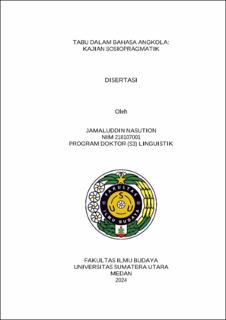| dc.description.abstract | The background of the research is caused by the existence of taboos in the Angkola
language (AL), namely something that must be avoided in speech, communication
and actions within a community group. The aim of the research is to categorize,
find the meaning of speech and euphemism patterns of taboo words in the AL. Other
aims are to create politeness in language and formulate reasons for taboo
communication from a sociopragmatic perspective. This research used a
qualitative design with a 12-step progressive ethnographic model (Developmental
Research Sequence) within a sociopragmatic framework. The research location is
the area where AL is used in North Padangsidimpuan District (Padangsidimpuan
City), West Angkola District (South Tapanuli Regency), Portibi District (North
Padanglawas Regency), and Ulu Barumun District (Padanglawas Regency). Data
collection used method of participatory observation and interviews with three
informants as key, main and additional informants. This research data is language
data and linguistic data consisting of primary data and secondary data. Language
data (primary) is in the form of words, phrases and sentences which contain taboos
such as swearing, cursing, harsh words, profanity, and magical words. Language
data (secondary) was obtained from books, dictionaries, and respondents’ answers
on Google Forms application. Language use data is verbal/nonverbal expressions
in AL. The data was analyzed to find the meaning of speech and euphemism patterns
as well as language symptoms using ethnographic communication theory and
language politeness theory. The results of this research show that the social
components in Angkola society are related to taboos in AL such as; gender, age,
religion, social status, occupation, region, location, etc. and it can be categorized
into four lexical relations, namely living things, body parts, social culture,
supernatural things. Taboo words in AL are functioned as expressions of fear,
curse, ridicule, annoyance, curse, joke, shock, surprise, admiration, avoid
shocking, convince, respect, asking for permission, and politeness. The novelty of
this research is that taboo words can be functioned as exclamative, to convince,
and it was found the forbidden communication in family relationships. The
relationship is between wife/husband of in-laws, siblings of different genders,
daughter-in-law to son-in-law, son-in-law to daughter-in-law, in-laws, our sister’s
wife, and our aunt’s daughter. This forbidden communication is functioned as
respect, to maintain self-esteem, to show politeness, and as a form of service. Taboo
in AL is a wisdom in cultural values and social norms to create ‘peace’. The fading
understanding of the AL taboo is due to the fact that people no longer communicate
intensively and there is massive geographical movement of people in the AL area.
Community activities no longer run based on local customs, and the AL is replaced
by Indonesian language. The use of social media (internet) in the era of
globalization is the reason for the fading of taboo communication culture.
Therefore, revitalization efforts are needed to maintain linguistic and cultural
harmony in the AL community. | en_US |


